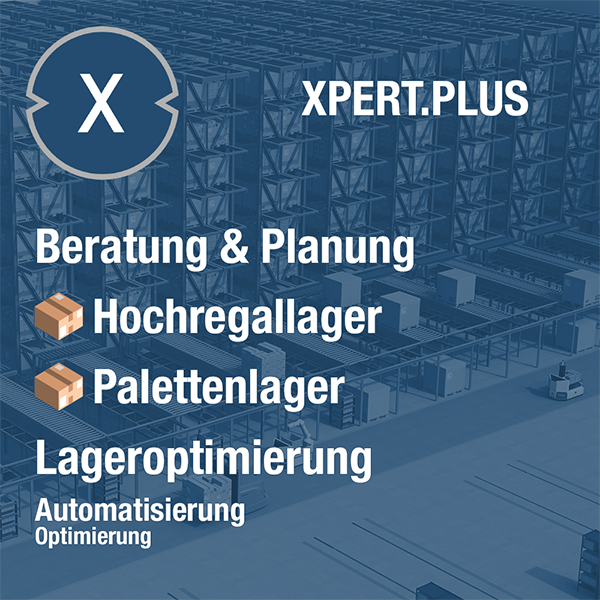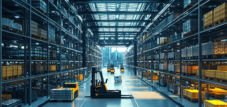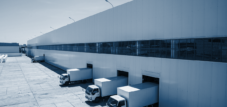Vollert Container Logistics Solution: heavy-duty intralogistics with multi-storey high-bay warehouse and shelf operating devices
Xpert pre-release
Language selection 📢
Published on: July 25, 2025 / update from: July 25, 2025 – Author: Konrad Wolfenstein

Vollert Container Logistics Solution: heavy-duty intralogistics with multi-storey high-bay warehouse and shelf operations devices – pictures: Vollert Anlagenbau GmbH
Vollert Anlagenbau GmbH – heavy-duty-intralogistics and multi-storey high-bay warehouse for containers
Heavy-loading intralogistics in change – the finished container logistics solution concept as the key to the automated, space-saving container logistics of the future
The international presence industry is currently experiencing a fundamental paradigm shift. Digital networking, increasing envelope volumes, the call for sustainable solutions and the pressure to make internal supply chains resilient, make traditional container courts and outdoor storage areas become increasingly a bottleneck. If sea, internal and industrial courtyards have been dominated by REACH stackers, portal or bridge cranes for decades, automated high-bay warehouses for standard containers are now focused on. One of the pioneers of this development is the Vollert Anlagenbau GmbH, based in Weinsberg in Swabia. With the finished container logistics solution concept, the company transmits its decades of heavy-duty and intralogistics experience from steelworks, concrete manufacturing systems and the automotive industry to container – and thus presents a modular modular system for high-compressed, multi-storey container stores, which at the same time combines efficiency, flexibility and environmental compatibility.
Suitable for:
- The top ten of the container high-class bearing manufacturers and guidelines: technology, manufacturer and future of port logistics
From the outdoor warehouse to multi -storey high -bay warehouse – why the paradigm shift is necessary
Several hundred million TEU are handled every year. So far, logistical hubs have been based on horizontal expansion: the volumes drove up, they increased the transshipment point or rented additional open spaces. But soil is scarce and expensive in many places; In addition, energy and personnel costs are increasing. At the same time, stricter emission requirements, noise protection requirements and increasing storm events ensure that classic open -air container stations reach economic and ecological limits. All of these factors favor vertical storage solutions in which containers are stacked on top of each other in shelf alley without stackers, straddle carriers or reach stackers have to permanently switch. This is exactly where the panel concept comes in.
Essential building blocks of the finished container logistics solution
1. Fully automatic, multi-storey high-bay warehouse (High-Bay Store, HBS)
The centerpiece forms a shelf frame made of high -strength steel, which – depending on the customer requirement – encompasses up to eight or more levels. ISO containers with up to 40 t total weight are stored in individually addressable warehouse subjects. In contrast to conventional block stacking, each container can be reached directly without surrounding processes. This saves time, energy and wear.
2. Compact heavy load rack control units (RBG)
Special design devices are used for the quick transport between the shelf alleys. They navigate on rails and lifting or procedures the containers using telescopic gripes. Thanks to frequency-controlled drives, energy feedback and high-resolution path measurement systems, the RBGS reach speeds that were previously only known from light pallet camps – but are now possible for 20- and 40-foot bins.
3. Modularity from the beginning
Both the steel construction grid as well as the RBG units and conveyor techniques are consistently modularly designed. Operators can initially install a core system and, if the handling quantities rose, integrate additional streets, levels or devices without stopping on running operation. This reduces investment risks and allows a gradual scaling.
4. Consistent software architecture
Behind the visible steel colossus there is an intelligent control and control level. Full of specially developed warehouse control software combines sensory real-time data with algorithms for idle optimization, prioritization and avoidance of collision. Via standardized interfaces – such as OPC UA or REST – the HBS can be seamlessly pitched on to overarching terminal operating systems or ERP platforms. Digital twins enable simulations, while condition monitoring modules report maintenance.
5. Interfaces to the outside world
Whether rail, inland ship or street access: The solution can dock on different levels with portal or bridge cranes, automated guided vehicles (AGV) or street trucks. The handover – such as shuttle tracks or so-called moving truck – ensure a continuous material flow from the delivery to the shipping gate.
Potentials in detail
Saving
Due to the vertical stacking, the basic area requirement is reduced by up to 70 percent compared to conventional container places of the same capacity. Free areas can be used for more value -added processes or converted into green areas.
Shortened throughput times
Because every container is controlled in a targeted manner, time -consuming surrounding processes are eliminated. At peak times, incoming and outsourcing sequences can be parallelized when several RBGS work simultaneously.
Weather and emission protection
The shelf building protects the goods from precipitation, UV radiation and storm. At the same time, the entire movement cycle runs fully electric. This saves diesel, lowers CO₂ emissions and minimizes noise pollution for employees and residents.
Occupational safety and ergonomics
Driverless systems reduce the risk of collisions, crashes or bruises. Operating personnel changes from physically stressful outdoor activities to be monitored in air-conditioned control rooms, which increases the attractiveness of the workplace.
Flexibility in the industry mix
From the seaport to rail terminals to decentralized container distribution for construction, chemical or automotive industry – where heavy-duty containers have to be moved quickly, safe and in value-preserved, module building boxes can be adapted full of adaptation. Even temperature -sensitive goods are conceivable if the shelf alleys are equipped as a thermal chamber, for example.
A look behind the scenes – this is how a full HBS cycle works
1. Arrival and identification
A truck or a rail wagon reaches the handover zone. Cameras systems record the container number while RFID tags connect to the order. The control system instantly assigns the container to the container.
2. Horizontal transfer
A shuttle system or a chain conveyor takes over the container and hands it over to the responsible shelf operator. These cross -transports are precisely clocked, so that waiting times are omitted.
3. Vertical positioning and storage
The RBG lifts the container to the target height, proceeds to the divided specialist address and relies on load -comprehensive steel supports. The permissible specialist burden is monitored by integrated weight sensors; Overload is automatically blocked.
4. Monitoring and inventory management
In parallel, the WMS updates the inventory in real time. Discreps with image detection can be clarified: Each subject optionally has cameras that send a snapshot when deviations.
5. outsourcing & shipping
The process takes place mirror image for calls. Sequence -optimized algorithms bundle orders after target relation so that tours or shipping can start without delay.
From the port to the high-tech factory solution: intelligent container logistics
Digitization and Industry 4.0 – more than just keywords
Vollert combines robust mechanics with modern IT concepts:
- Digital twins simulate load collectives, roads and energy flows in order to find optimal layouts in the project period.
- Using vibration or temperature data, Predictive maintenance recognizes when drives or rollers have to be exchanged before failures occur.
- Artificial intelligence optimizes storage strategies by analyzing historical call patterns and often positioned containers required in access hotspots.
- Safety layers protect against unauthorized access and ensure that emergency stop signals set off all movements within milliseconds.
Sustainability as a guiding principle
A container HBS not only saves diesel consumption of traditional yard equipment. Additional measures increase the ecological balance:
- Regenerative energy recovery: When braking brakes, the frequency converter of the RBGS feeds electricity back into the network.
- Photovoltaics on roof surfaces: The huge roofs are predestined for solar panels that cover part of the self -consumption.
- LED lighting with presence control reduces current consumption by up to 70 percent compared to conventional lights.
- Steel construction recycling: Vollert relies on pure steel variety, which can be almost completely recycled in system conversions.
Case Study – Lufthansa Cargo Hub Frankfurt
The extensive hub modernization at Frankfurt Airport shows how the technology proves itself in practice. Lufthansa Cargo had to accelerate her road feeder service (RFS) in order to further reduce the lead time between the cargo aircraft and truck. Although this is Unit Load Devices (ULDS) and not ISO Sea freight containers, the principles are identical.
The heart of the project: two 28 m high full-time shelf control units that revitalized the existing high-bay warehouse. They were supplemented by innovative moving truck docks – movable docking stations that load and unload entire truck trailers within a few minutes. The result was significantly increased envelope capacities, lower personnel costs and a smooth 24/7 operation even with top volume during night flight waves.
The special highlight: all measures took place in "Brownfield mode". Instead of interrupting the freight operation, Vollert modules for module installed in nightmen maintenance windows. The modular system architecture thus paid off twice – in the first installation and in future extensions.
Economy and return on investment
Automation costs money, but it usually pays off quickly:
- Personnel savings arise because RBGS run around the clock without changing shift.
- Higher space redesignity lowers lease or investment costs for land.
- Light -line process times reduce crops through delays and improve delivery loyalty.
- Energy efficiency pays off in reduced operating costs.
- The residual value of the steel construction offers predictability: The shelf frame can be transferred or sold if necessary.
Customers report that the system will pay for themselves in four to six years – a period that can continue to decrease in view of funding programs for climate -neutral logistics.
Scalable fields of application beyond classic port logistics
1. Industrial inbound
Automobile OEMs receive pre-assembled components in high-sea containers. An internal HBS allows material to be available at the assembly line without having to be unpacked without containers.
2. Chemical industry
Containerized chemicals can be stored in isolated alleys, while sensors monitor temperature or filling stands. Hazardous substances remain traceable at all times.
3. Off-site construction
Preferred house or module manufacturers send complete spatial modules in special containers. An automatic HBS accelerates the construction site delivery and protects sensitive surfaces.
4. Disaster protection depots
State organizations are stored in containers that have to be loaded within hours in the event of a crisis. A container HBS ensures that medical equipment, tents and water treatment plants are available in the correct order.
Care, maintenance and life cycle management
Vollert not only provides the hardware, but a holistic life cycle support package. Regular remote health checks, spare parts pooling and maintenance contracts shift responsibility from the operator to the delivery side. This makes the overall system effectiveness (OEE) transparent and predictable; Stall stands can be reduced to a minimum.
Update from July 23, 2025:
- Insolvency: Vollert Anlagenbau GmbH, provider of intralogistics, prefabricated concrete and maneuvering systems, is bankruptcy
Looking into the future – where is the journey going?
- 5G campus networks will continue to minimize latency times and enable autonomous vehicles to cooperate seamlessly with shelf operating devices.
- Edge computing brings computing power to where data is incurred. Instead of central server, every RBG processes decisions locally and only highly aggregated information migrate into the cloud.
- Green steels and alternative construction materials such as carbon concrete will reduce the CO₂ footprint of the system construction in the future.
- Micro-grids couple PV systems, battery storage and consumers to the energy-sufficient terminal.
Completed positions here as an enabler by remaining open to the existing modular system for upgrades. So if you build an HBS today, you can retrofit new features tomorrow with little effort.
At a time when areas are scarce, supply chains are vulnerable and sustainability goals are ambitious, the finished container logistics solution concept provides a pragmatic and future -oriented answer. The combination of proven heavy load DNA, modular mechanics and the latest software creates a system that operates several adjustment screws at the same time: higher envelope power, lower operating costs, better environmental balance and increased occupational safety. The successful implementation at the Lufthansa-Cargo hub underlines the practice maturity as well as the potential for various industries. Companies that invest in automated high -bay warehouse for containers today create the basis for a competitive, flexible and climate -friendly logistics of tomorrow.

Xpert.plus warehouse optimization – high -bay warehouse such as pallet warehouse advice and planning
We are there for you – advice – planning – implementation – project management
☑️ Our business language is English or German
☑️ NEW: Correspondence in your national language!
I would be happy to serve you and my team as a personal advisor.
You can contact me by filling out the contact form or simply call me on +49 89 89 674 804 (Munich) . My email address is: wolfenstein ∂ xpert.digital
I'm looking forward to our joint project.


























